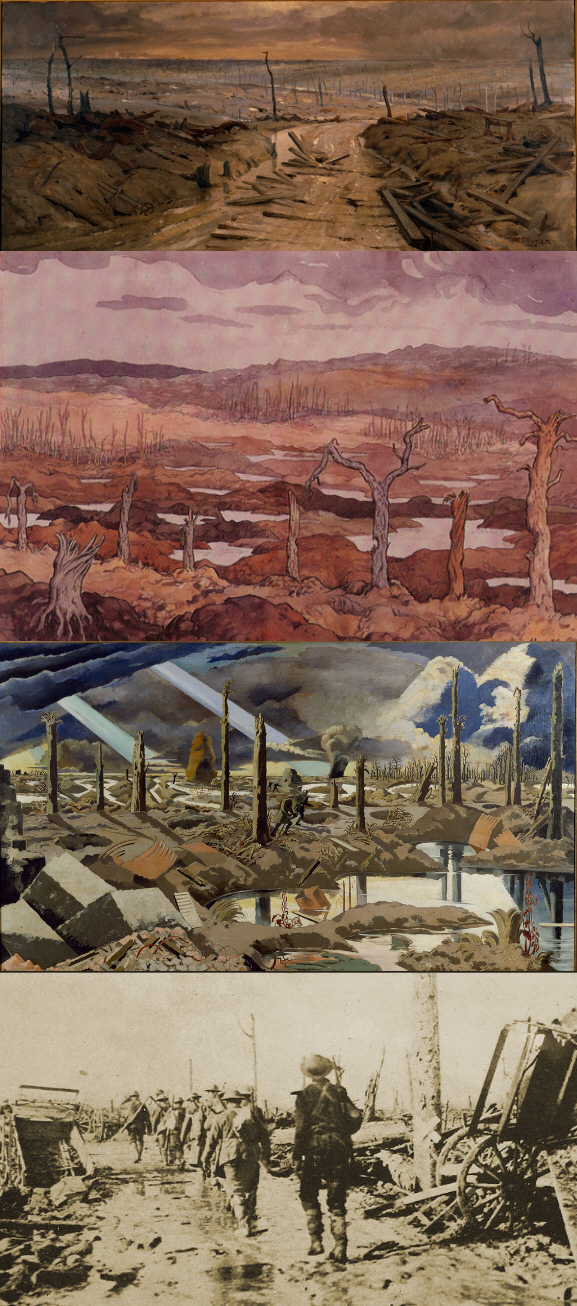Rites of Spring. The Great War and the Birth of the Modern Age
(First Marine Books edition), 2000
Rites of Spring is about death and destruction, rupture, disorder, and crisis — some of the most important features of the modernist period. Eksteins argues that it was the Great War that was the psychological turning point for modernism; after 1918, he claims, "The urge to create and the urge to destroy had changed places." Eksteins focuses on the emergence of our modern consciousness in the first half of the twentieth century — and more specifically, on our obsession with social, artistic, and sexual emancipation.
Click on Image to Expand
Modernism Marching Down the Menin Road
From top (All are titled "Menin Road"): A conventional landscape by George Edmund Butler; expressionistic (?) interpretation by Ian Strang; semi-abstract semi-cubist (?) painting by Paul Nash; Menin Road (actual)
The title of Eksteins's study comes from Stravinsky's ballet, a landmark of modernism. The main motif of the ballet is movement. By movement, Eksteins means the dance of death as a result of our acquisition of the power of ultimate destruction. In our pursuit of life and emancipation, he argues, we have killed off millions of our best human beings. Rites of Spring is a cultural history that incorporates not only music, ballet, and other arts but also manners and morals, customs, and values. In this respect, it is similar to Samuel Hynes's A War Imagined: The First World War and English Culture (1991); unlike Hynes, however, Eksteins focuses on the avant-garde and modernism, claiming that the latter is "the principal urge of our time".
For Eksteins, the state of human consciousness after the war is best traced in the lives and words of ordinary people. These demonstrate a profound spiritual crisis, which affects rural laborers, large landowners, industrialists, factory workers, shop clerks, and urban intellectuals alike. Economic and social insecurity underlined and intensified a crisis of values brought about by the war and its aftermath, particularly the peace that failed to meet the expectations promised by leaders during the war. Eksteins quotes Paul Valéry in a lecture in Zurich in 1922: "and still we are restless, uneasy, as if the storm were about to break. Almost all the affairs of men remain in a terrible uncertainty." Valéry was alluding to all that had been injured by the war: economic relations, international affairs, and individual lives. Above all, it was the human mind, he argued, that had been most severely wounded. Eksteins supports this claim.
Order Now |
While some historians such as Professors Robert Wohl and Jay Winter have criticized Eksteins for making "outrageous statements" (Jay Winter (ed.), The Legacy of the Great War Ninety Years On, 2009), the same historians have also described Rites of Spring as "exciting, very exhilarating to read, and very provocative." Rites of Spring is indeed a daring project, which brings together the avant-garde, modernism, and the social, political, and artistic agents of revolt in the aftermath of the war. Eksteins promises (and delivers) an "historical account [that] proceeds in the form of a drama, with acts and scenes, in the full and diverse sense of these words. In the beginning was the event. Only later came consequence."
Rites of Spring is original, witty, and perceptive. Written in clear and easy-to-read prose, it is also a solid scholarly work, copiously annotated, and packed with references, artistic, political, and social. There is indeed something for everyone who is interested in how the war changed forever our view of life and history as well as how it radically altered the psychology of Europe. Rites of Spring is a book that should not be missed!
Jane Mattisson
Rites of Spring is original, witty, and perceptive. Written in clear and easy-to-read prose, it is also a solid scholarly work, copiously annotated, and packed with references, artistic, political, and social. There is indeed something for everyone who is interested in how the war changed forever our view of life and history as well as how it radically altered the psychology of Europe. Rites of Spring is a book that should not be missed!
Jane Mattisson


Brava. This was an avoided work until your review. Cheers
ReplyDeleteThank you, Jane, for this review. I hope it inspires people to read, or re-read the book. To me, it's unconventional but brilliant. Completely and successfully makes the case that the scope of the war and its aftermath deeply changed not just the daily lives and philosophies of everyone but also developments in all the art forms.
ReplyDelete